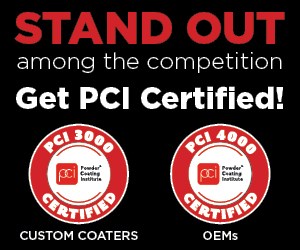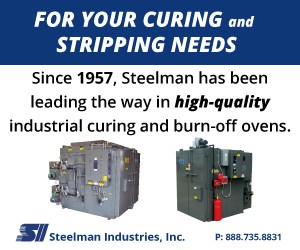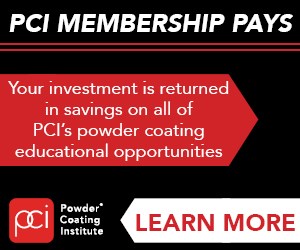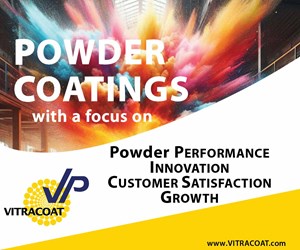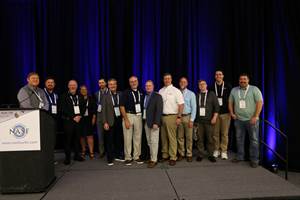Top Shop Builds Original Systems for Coating Medical Devices
Engineers at Surgical Coatings in Colorado have been ingeniously developing their own equipment, automation, processes and software since this powder coater’s inception in 1995.
When doing essential work that involves coating lifesaving medical devices, quality is not a question on the shop floor, it is a demand.
“Everyone in this company has the ability to shut things down and stop operations if something doesn’t look right,” says President and CEO James Morris at Surgical Coatings. “We’re very quality conscious, and we all know that everything we work on is going to be used on somebody’s mother, father, son or daughter.”
Steadily focusing on and staying true to the one industry it knows best, this Products Finishing Top Shop in Sedalia, Colorado, has exclusively served the medical device industry, offering polymer coatings, since 1995. Morris explains that 90% of its work is coating minimally invasive surgery components, including electrosurgical, laparoscopic and robotic-assisted surgery components.
To have the utmost control over its high-quality standards for coating critical parts, Morris relies solely on its own engineers who have designed and developed all the company’s automated coating equipment, software and processes, including a trademarked masking method. As a result, Surgical Coatings has learned a great deal about coating chemistry and materials and how they relate and react to the body, which is another way the company is capable of producing high-quality products.
As it continues to expand its capabilities, the business is in the process of moving its location to a newly constructed larger facility in Colorado.
Engineered for success

Surgical Coatings has a culture of quality, according to President and CEO James Morris. “These are not elective surgeries that we're building components for and providing surface coatings for; every single one of these devices is going into a lifesaving procedure.”
Source (all): Surgical Coatings
In 1995 when the shop opened its doors, automation was a progressive concept. But the company’s engineers were so forward thinking that they realized they could develop their own automated systems for specific needs while having a full grasp on quality control.
The team has decades of experience with mechanical and electrical engineering, thermodynamics, computational fluid dynamics and full stack software architecture.
“So, with the experience and expertise of our in-house engineering staff, we’re able to design coating and automated equipment for these specialized processes that are above and beyond and have been since the mid ‘90s,” Morris explains. “We don’t outsource any of our automated equipment. That’s all engineered by us. It’s designed by us. It’s built by us. It’s integrated by us.”
He adds, “We’ve said around the shop that we were 15 years early to the automation party.”
A unique masking method
In addition to creating the most efficient coatings processes for its operation, Surgical Coatings’ engineers have also developed a new technology it calls “Virtual Masking,” which has been trademarked. The process involves coating a substrate in its entirety, then using lasers to remove that coating in specific, tight tolerance areas to create coating-free area geometries.
“This enables us to create unique geometries that otherwise could not be achieved in an overmold situation,” Morris says. “And it enables us to achieve a uniform coating thickness around some unique substrate geometries for some of these medical devices.”
The company uses Virtual Masking for laparoscopic and arthroscopic tubes that pass through cannulas or trocars during minimally invasive surgery. The new technology ensures the coating stops at a certain point and that the coating has a full thickness at the stop point. “You can put a patient into ‘AFib’ if you don’t have consistent coating thickness or a solid termination on that coating-free area,” Morris explains.
Becoming a Top Shop
Its Virtual Masking method is one example of how Surgical Coatings finds solutions to roadblocks within its processes independently. Morris believes

With only 7,000 square feet of space, the original shop housed one powder coating cell and one liquid coating cell. The new facility has completely redundant, new powder and liquid spray coating cells, Morris says.
the company has been named a Top Shop because of its ability to find workarounds on a regular basis as well as its quality control.
“We will make needles, nozzles, and other gun parts to find solutions for our customers,” he explains. “We will take an off-the-shelf powder coating gun and build custom components to aid our application and consistency. We will struggle and suffer and fail continuously until we figure it out.”
The automated lines measure every part in multiple locations. For simple tubes, the automated coating line measures incoming diameters in two locations. Once the coating is applied, the system monitors the resulting diameter in four locations, closing the automation feedback loop and providing critical data on variables used to achieve the desired coating thickness.
As it completes 10 to 15 audits per year, he adds that the company welcomes audits and the feedback that accompanies them.
Plastics education
As a medical device coatings shop that uses polymer coatings often, Morris says he must defend the use of these types of coatings because of the common misconception of plastics. He understands that plastics are getting a bad rap in society, which is well deserved in regard to ingesting chemicals from plastics. However, he explains there is no need to be alarmed when plastics are used on surgical devices.
“Some plastics chemicals can leach into food sources, which is a big deal, especially for consumption,” he says. But medical devices made of plastic do not affect the body negatively because although they might be placed inside the body, the plastic is not digested, which is important to differentiate.
Surgical Coatings continues to educate its customers on this topic. Morris says he hopes to clarify the crucial role plastics play in the industry, as these devices are implemented to save people’s lives and extend lifespan.
On the move
Since 1997, the company has been in the same facility that they have since outgrown. With only 7,000 square feet of space, the small shop houses one powder coating cell and one liquid coating cell.

The company’s new 23,000-square-foot facility in Littleton, Colorado, is slated to be fully functioning by the second quarter of 2025. The old building will completely shut down once the new one is ready.
Finally, the shop is in the process of moving to a new 23,000-square-foot facility in Littleton, Colorado, as this article is being written. The new building is carefully thought out and will eventually house all the company’s equipment.
“In our new facility, we’ll have completely redundant, new next-generation powder and liquid spray coating cells,” Morris says. “The facility here in Sedalia will shutter off, hopefully by the end of the first or second quarter next year.”
Related Content
Top Shop Aces Outstanding Customer Service
More than a finishing shop, this anodizing, powder coating and vacuum resin impregnating business goes above and beyond for its customers by being a resource for whatever their finishing needs might demand.
Read MoreProducts Finishing Reveals 2023 Qualifying Top Shops
Each year PF conducts its Top Shops Benchmarking Survey, offering shops a tool to better understand their overall performance in the industry. The program also recognizes shops that meet a set of criteria to qualify as Top Shops.
Read MoreDefining a Top Shop: Quality, Quickness, Communication, Community
Luke Engineering & Anodizing Co. takes an active role in its community and the industry while also focusing heavily on the quality of its work and employee treatment.
Read MoreStrategic Acquisitions and Versatility Set This Shop Apart
Associated Finishing continues to evolve and grow, stretching its capabilities to meet the needs of its customers.
Read MoreRead Next
A ‘Clean’ Agenda Offers Unique Presentations in Chicago
The 2024 Parts Cleaning Conference, co-located with the International Manufacturing Technology Show, includes presentations by several speakers who are new to the conference and topics that have not been covered in past editions of this event.
Read MoreEducation Bringing Cleaning to Machining
Debuting new speakers and cleaning technology content during this half-day workshop co-located with IMTS 2024.
Read MoreEpisode 45: An Interview with Chandler Mancuso, MacDermid Envio Solutions
Chandler Mancuso, technical director with MacDermid Envio discusses updating your wastewater treatment system and implementing materials recycling solutions to increase efficiencies, control costs and reduce environmental impact.
Read More









